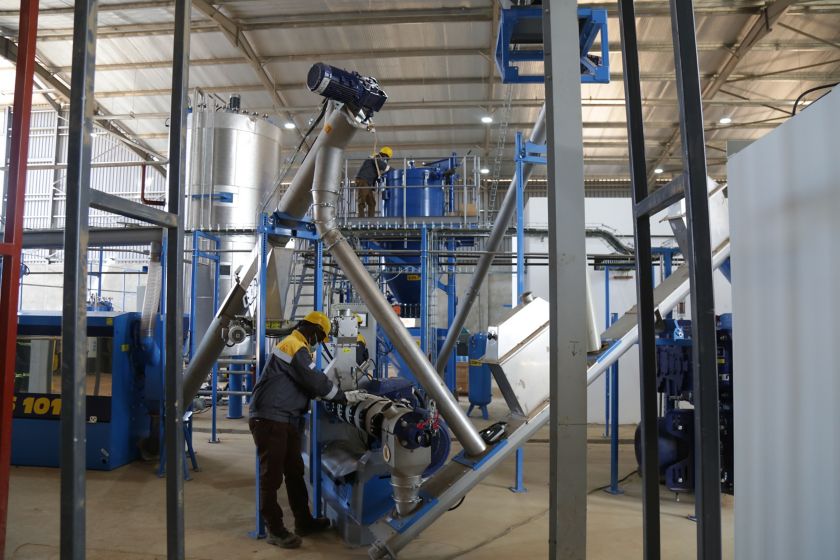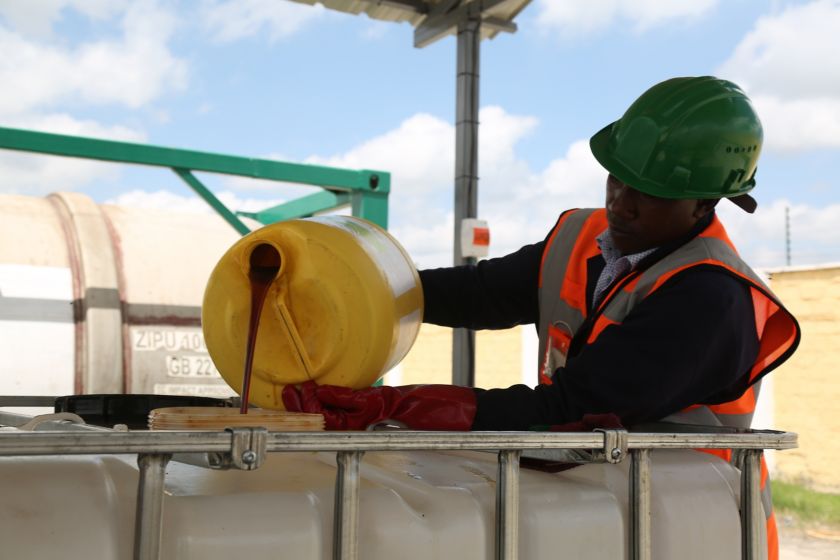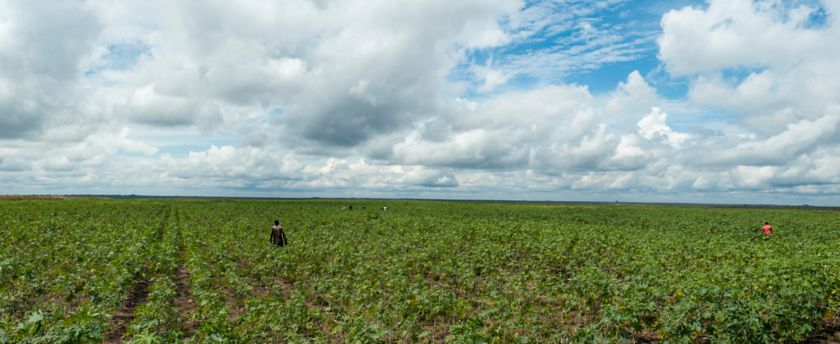Type of Activity
Bioenergy
Biorefining
Chemistry
Energy from renewables
Environmental remediation

Or , our new artificial intelligence tool.

We built our first biorefinery in Porto Marghera, Venice by converting old plants thanks to technologies developed by our Research Centres. Renewal has also involved the other production cycles, making them more and more energy transition oriented. With this approach, we have increased the installed capacity of renewables and are developing a hub for plastic recycling.
The plan to transform the Porto Marghera industrial site was launched many years ago and involves all the activities of Eni and its subsidiaries Enilive, Eni Rewind, Versalis and Plenitude. The planned activities will help us implement through new industrial projects the energy transition, the reduction of CO2 emissions and the development of the circular economy also applied to energy. The transformation plan involves investments of around 790 million euros and re-employment of the staff.

Thanks to the biorefinery’s capacity of around 0.4 million tonnes per year, we can convert biofeedstocks into biofuels using Eni technology.

We carry out environmental restoration and remediation activities across various affected areas.

By implementing various technologies, we are developing a circular economy model through plastic recycling projects.

We repurpose decommissioned areas to unlock production potential by installing photovoltaic plants.

We use hydrogen as feedstock and in 2022 we opened our first service station in Venice Mestre that supplies hydrogen for mobility.
Region: Veneto
Activity start date: 2014 - present
The bio-refinery in Venice produces quality biofuel (HVO - Hydrotreated Vegetable Oil) from raw biogenic materials. At the time of its opening in 2014, it was the world's first example of fully converting a traditional refinery into a biorefinery. The process is based on our proprietary EcofiningTM technology. The biorefinery is mainly (about 85%) fuelled by waste raw materials, such as waste cooking oil, animal fats and residues from the agro-food industry for the production of biofuels, HVO diesel, bio-LPG, biojet and bio-naphtha for the chemical chain.
In Venice, a plant for the production of Sustainable Aviation Fuel (SAF) is awaiting the necessary permits. The processed bio-components, after distillation, will produce biojet, a fuel that can be blended with conventional products.

Vegetable oil production in the Makueni agri-hub in Kenya


Castor bean plantation in Kenya
the biorefinery’s current processing capacity
processing capacity to be increased in the plan period
The former petrochemical plant in Gela is considered a Site of National Priority, i.e., an area requiring special remediation work as a result of operations carried out over decades by several companies. The environmental reclamation of the site is the responsibility of Eni Rewind, Eni's environmental company. The first activities began in the 1990s with the securing of decommissioned plants and the systematic soil and water testing campaign. Subsequently, the actual reclamation activity began, which has already been completed for some areas, while for the remainder it is in progress. As part of the Porto Marghera redevelopment plan, Eni Rewind presented a project for the drying and energy exploitation of residues from civil sewage (sewage sludge) using the most advanced currently available technologies.
water treated in 2023
The transformation of production activities in Porto Marghera also involves Versalis, Eni's chemical company, through new industrial initiatives based on the circular economy model. The flagship project foresees the creation of a hub for the advanced mechanical recycling of post-consumer plastics. During the initial phase, the aim is to obtain packaging and building products completely from expanded and compacted polystyrene waste, selected from industry and trade. Then, a plant will be built for the advanced mechanical recycling of sorted plastic waste, obtained from separate waste collection, particularly polystyrene and high-density polyethylene. In addition, the first plant in Italy will be built for the production of isopropyl alcohol, an ingredient in disinfectants, detergents and many other products that is currently imported in its entirety. In parallel, we are investing in strengthening the logistics hub to further increase its flexibility.
isopropyl alcohol production at full capacity
recycled content in the future production of polystyrene
In Porto Marghera, through Plenitude, we are completing two photovoltaic plants in areas that were once used for industrial processes and already undergoing environmental redevelopment by Eni Rewind. This way, in addition to providing renewable energy to the production site, we have optimised the use of the production area by reusing brownfield sites that could not accommodate any other types of activities.
photovoltaic plant under construction
photovoltaic plant under construction
hydrogen fuelling station for mobility

If you want to change topic, clear the chat and make a new query to receive more relevant results.
This will delete the question history.
If you want to change topic, clear the chat and make a new query to receive more relevant results. This will delete the question history.
Here you can find the full list of your queries.
The answers are generated by artificial intelligence, therefore they may contain inaccuracies. Please read the terms and conditions of use.

EnergIA is an innovative tool based on artificial intelligence capabilities, which can help you navigate the contents of eni.com, quickly finding answers to your questions. EnergIA can also perform a search on a specific topic, providing the most up-to-date data available, or it can invite you to delve deeper into a topic of your interest by suggesting links and specific readings. Start now!
EnergIA is an innovative tool based on artificial intelligence capabilities, which can help you navigate the contents of eni.com, quickly finding answers to your questions. Start now!
EnergIA (ener'dʒia) is a system based on Generative Artificial Intelligence.
Thanks to this technology, we can respond to your requests by querying the most relevant content and documents available on eni.com. (Note: financial documents from the last 12 months and press releases from the last 2 years are considered.)
Through EnergIA, you can delve into topics of interest and have a real-time window into the world of Eni.
If you wish to search for a specific document, press release or news, use the traditional search engine via the magnifying glass icon.
Like all systems that leverage Generative Artificial Intelligence, EnergIA may generate inaccurate or outdated responses. Always consult the sources that EnergIA proposes as the origin of the generated information.
If the system fails to find an exact match for the requested content, it still tends to provide a response.
If you find any inaccuracies in the provided response, please send us your feedback at the bottom of the page: it will be very helpful for us to improve.
Remember that the content generated by the system does not represent Eni’s official position. We therefore invite stakeholders to refer to their designated contacts for official statements: Press Office for journalists, Investor Relations for analysts and investors, Company Secretariat for shareholders etc..
EnergIA can understand questions posed in almost all languages, but we prefer to provide you with a response in English or Italian, the two languages available on eni.com. If you ask a question in Italian, the content on the site in Italian will be consulted. If you ask it in English or any other language, the content in English will be consulted. (Note: the language Eni uses for financial documents/content is predominantly English.)
If questions are formulated that violate the set security criteria, the system will not proceed with processing the response. Please remember not to send personal data.
By using this service, the users acknowledge that they have read and accepted the terms and conditions of use.
Search
EnergIA (ener'dʒia) is a system based on Generative Artificial Intelligence.
Thanks to this technology, we can respond to your requests by querying the most relevant content and documents available on eni.com. (Note: financial documents from the last 12 months and press releases from the last 2 years are considered.)
Through EnergIA, you can delve into topics of interest and have a real-time window into the world of Eni.
If you wish to search for a specific document, press release or news, use the traditional search engine via the magnifying glass icon.
Like all systems that leverage Generative Artificial Intelligence, EnergIA may generate inaccurate or outdated responses. Always consult the sources that EnergIA proposes as the origin of the generated information.
If the system fails to find an exact match for the requested content, it still tends to provide a response.
If you find any inaccuracies in the provided response, please send us your feedback at the bottom of the page: it will be very helpful for us to improve.
Remember that the content generated by the system does not represent Eni’s official position. We therefore invite stakeholders to refer to their designated contacts for official statements: Press Office for journalists, Investor Relations for analysts and investors, Company Secretariat for shareholders etc..
EnergIA can understand questions posed in almost all languages, but we prefer to provide you with a response in English or Italian, the two languages available on eni.com. If you ask a question in Italian, the content on the site in Italian will be consulted. If you ask it in English or any other language, the content in English will be consulted. (Note: the language Eni uses for financial documents/content is predominantly English.)
If questions are formulated that violate the set security criteria, the system will not proceed with processing the response. Please remember not to send personal data.
By using this service, the users acknowledge that they have read and accepted the terms and conditions of use.
A new window into Eni’s world, at your disposal. EnergIA is an innovative tool based on artificial intelligence capabilities, which can help you navigate the contents of eni.com, quickly finding answers to your questions.